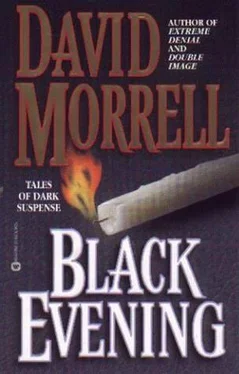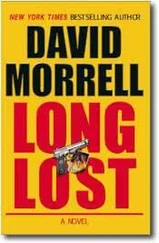David Morrell - Black Evening
Здесь есть возможность читать онлайн «David Morrell - Black Evening» весь текст электронной книги совершенно бесплатно (целиком полную версию без сокращений). В некоторых случаях можно слушать аудио, скачать через торрент в формате fb2 и присутствует краткое содержание. Жанр: Ужасы и Мистика, на английском языке. Описание произведения, (предисловие) а так же отзывы посетителей доступны на портале библиотеки ЛибКат.
- Название:Black Evening
- Автор:
- Жанр:
- Год:неизвестен
- ISBN:нет данных
- Рейтинг книги:4 / 5. Голосов: 1
-
Избранное:Добавить в избранное
- Отзывы:
-
Ваша оценка:
- 80
- 1
- 2
- 3
- 4
- 5
Black Evening: краткое содержание, описание и аннотация
Предлагаем к чтению аннотацию, описание, краткое содержание или предисловие (зависит от того, что написал сам автор книги «Black Evening»). Если вы не нашли необходимую информацию о книге — напишите в комментариях, мы постараемся отыскать её.
Black Evening — читать онлайн бесплатно полную книгу (весь текст) целиком
Ниже представлен текст книги, разбитый по страницам. Система сохранения места последней прочитанной страницы, позволяет с удобством читать онлайн бесплатно книгу «Black Evening», без необходимости каждый раз заново искать на чём Вы остановились. Поставьте закладку, и сможете в любой момент перейти на страницу, на которой закончили чтение.
Интервал:
Закладка:
"That's something else I'll check for when I do the autopsy," the medical examiner said.
"And I'll talk to her doctor," Clauson said, determined.
Grady's sadness fought with his confusion. "So how does this involve me? You told me it was something about his hand. Something he clutched."
Clauson looked reluctant. "I'm afraid there's no good way to do this. I'm sorry. I'll just have to show you. Brian left a note."
"I was going to ask if he did. I need answers."
Clauson pulled a plastic bag from a pocket in his shirt. The bag contained a piece of paper.
Grady murmured, "If Brian left a note, there's no question. Combined with the way he loaded the forty-five, there's no doubt he made careful plans. Perhaps along with…" Grady shuddered. "I've got the terrible feeling Betsy agreed."
"That thought occurred to me," Clauson said. "But there's no way we'll ever know. He had this piece of paper clutched around the grip of the pistol. When the forty-five dropped from his hand, the note stuck to his fingers."
Grady studied it and shivered.
The note was printed boldly in black ink.
TELL BEN GRADY. BRING HIM HERE.
That was all.
And it was too much.
"Bring me here? Why?"
"That's why I said we had to talk." Clauson bit his lip. "Come on, let's get away from where this happened. I think it's time for a stroll."
They emerged from the swimming pool area and crossed a stretch of gravel, their footsteps crunching as they passed the barbecue pit as well as two redwood picnic tables and approached the largest of the cinderblock buildings. It was thirty feet long and half as wide. A metal chimney projected from the nearest wall and rose above the roof. There were three dusty windows.
"Bring you here." Clauson echoed Brian's note. "That can mean different things. To see the bodies, or to see the compound. I didn't know Brian well, but my impression is, he wasn't cruel. I can't imagine why he'd have wanted you to see what he'd done. It makes me wonder if…"
Grady anticipated the rest of the question. "I've never been here. In fact, I didn't know this place existed. Even with the directions you relayed through my office, I had trouble finding the lane."
"And yet you and the Roths were close."
"Only recently – within the last year. I met them at a meeting of The Compassionate Friends."
"What's…"
"An organization for parents who've lost a child. The theory is that only a parent in grief can understand what another parent in grief is going through. So the grieving parents have a meeting once a month. They begin the meeting by explaining how each child died. There's usually a speaker, a psychiatrist or some other type of specialist who recommends various ways of coping. Then the meeting becomes a discussion. The parents who've suffered the longest try to help those who still can't believe what happened. You're given phone numbers of people to call if you don't think you can stand the pain any longer. The people you talk to try their best to encourage you not to give in to despair. They remind you to take care of your health, not to rely on alcohol or stay in bed all day, instead to eat, to maintain your strength, to get out of the house, to walk, to find positive ways to fill your time, community service, that sort of thing."
Clauson rubbed the back of his neck. "You make me feel embarrassed."
"Oh?"
"When your wife and son were killed, I went to the funeral. I came around to your house once. But after that… Well, I didn't know what to say, or I told myself I didn't want to bother you. I suppose I figured you'd prefer to be left alone."
Grady shrugged, hollow. "That's a common reaction. There's no need to apologize. Unless you've lost a wife and child of your own, it's impossible to understand the pain."
"I pray to God I never have to go through it."
"Believe me, my prayers go with you."
They reached the largest cinderblock building.
"The lab crew already dusted for prints." Clauson opened the door, and Grady peered in. There were sleeping bags on cots along each wall, two long pine tables, benches, some cupboards, and a wood-burning stove.
"Obviously more people than Brian and Betsy used this place," Clauson said. "Have you any idea who?"
"I told you I've never been here."
Clauson closed the door and proceeded toward a smaller cinderblock building next to it.
This time, when Clauson unlatched and opened the door, Grady saw a wood-burning cook stove with cans and boxes of food as well as pots, pans, bowls, plates, and eating utensils on shelves along the walls.
"I assume," Clauson said, "that the barbecue pit was for summer, and this was for rainy days, or fall, or maybe winter."
Grady nodded. "There were twelve cots in the other building. I noticed rain slickers and winter coats on pegs. Whoever they were, they came here often. All year round. So what? It's a beautiful location. A summer getaway. A hunting camp in the fall. A place for Brian, Betsy, and their friends to have weekend parties, even in winter, as long as the snow didn't block the lane."
"Yeah, a beautiful location." Clauson shut the door to the kitchen, directing Grady toward the final and smallest structure. "This was the only building that was locked. Brian had the key on a ring along with his car keys. I found the key in his pants pocket."
When Clauson opened the door, Grady frowned.
The floors in the other buildings had been made from wooden planks, except for fire bricks beneath the stoves. But this floor was smooth, gray slate. In place of the cinderblock walls in the other buildings, the walls in here had oak paneling. Instead of a stove, a handsome stone fireplace had a shielded slab of wood for a mantle, an American flag on each side, and framed, glistening photographs of eight smiling youngsters – male and female – positioned in a straight line above the flags. The age of the youngsters ranged, Grady estimated, from six to nineteen, and one image of a boy – blond, with braces on his teeth, with spectacles that made him look uncomfortable despite his determined smile – reminded Grady distressingly of his own, so longed-for son.
He took in more details: a church pew in front of the photographs above the fireplace, ceramic candle holders on the mantel, and… He stepped closer, troubled when he realized that two of the smiling faces in the photographs – lovely, freckled, red-headed girls, early teens – were almost identical. Twins. Another pattern he noticed, his brow furrowing, was that the oldest males in the photographs, two of them, late teens, had extremely short haircuts and wore military uniforms.
"So what do you make of it?" Clauson asked.
"It's almost like…" Grady felt pressure in his chest. "Like a chapel. No religious objects, but it feels like a chapel all the same. Some kind of shrine. Those twin girls. I've seen them before. The photographs, I mean. Brian and Betsy had copies in their wallets and showed them to me a couple of times when they invited me over for dinner. They also had larger, framed copies on a wall in their living room. These are Brian and Betsy's daughters." Grady's stomach hardened. "They died ten years ago when a roller coaster jumped its tracks at a midway near Pittsburgh. Brian and Betsy never forgave themselves for letting their daughters go on the ride. Guilt. That's something else grieving parents suffer. A lot of guilt."
Grady stepped even closer to the photographs, concentrating on the blond, vibrant, ten-year-old boy with glasses and braces that reminded him so painfully of his son. The likeness wasn't exactly the same, but it was poignantly evocative.
Guilt, he thought. Yes, guilt. What if I hadn't been working late that night? What if I'd been home and Helen and John hadn't decided to go out for pizza and a movie? That drunk driver wouldn't have hit their car. They'd still be alive, and it's all my fault because I decided to catch up on a stack of reports that could just as easily have waited until the morning. But no, I had to be conscientious, and because of that, I indirectly killed my wife and son. Not showing it, Grady cringed. From a deep, black, torture chamber of his mind, he wailed silently in unbearable torment.
Читать дальшеИнтервал:
Закладка:
Похожие книги на «Black Evening»
Представляем Вашему вниманию похожие книги на «Black Evening» списком для выбора. Мы отобрали схожую по названию и смыслу литературу в надежде предоставить читателям больше вариантов отыскать новые, интересные, ещё непрочитанные произведения.
Обсуждение, отзывы о книге «Black Evening» и просто собственные мнения читателей. Оставьте ваши комментарии, напишите, что Вы думаете о произведении, его смысле или главных героях. Укажите что конкретно понравилось, а что нет, и почему Вы так считаете.












